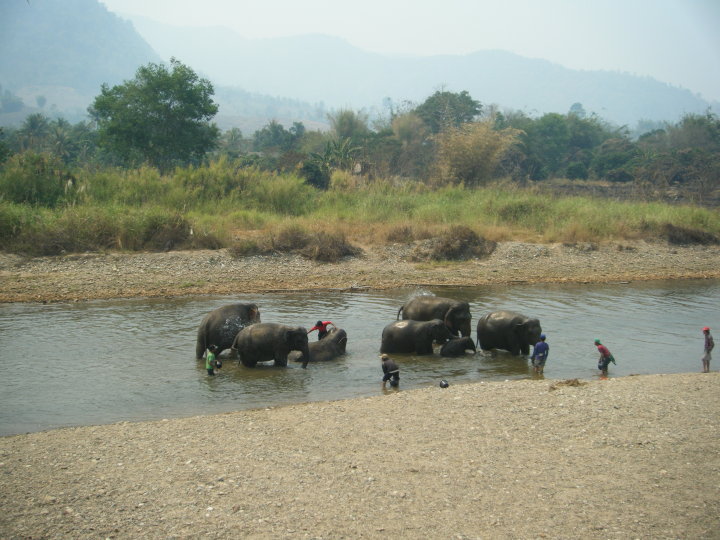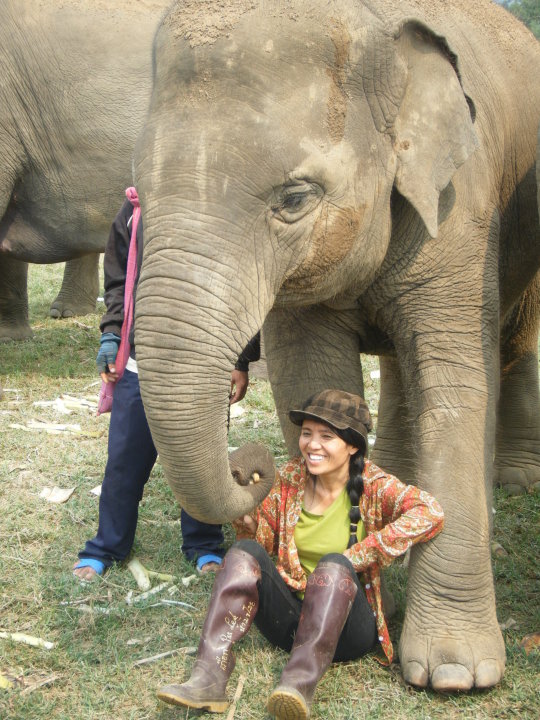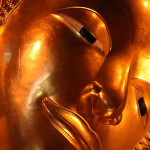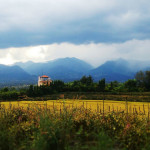
Elephants are everywhere in Thailand! They symbolise good luck, wisdom, power and fortune and are often seen in temples – as statues, not the real animals!
However, the many contradictions within the Thai culture means that although elephants are immensely well thought of – they even celebrate “Elephant Day” in March – they are so badly treated within the country.
You will see elephant treks advertised almost everywhere you go in Thailand, allowing people to ride elephants, wash them, feed them, watch them paint pictures, play football and so on. Some even advertise the fact that they are supporting the saving of elephants but this is completely untrue if it involves any sort of show or constant trekking of their animals. Elephants don’t play football or paint pictures in the wild! As such they are being forced to do so and, to achieve this, torture and abuse is most definitely involved. Elephants also don’t carry humans in the wild. It may seem like the elephants are so large that they probably can’t even feel you, but they are extremely sensitive animals and their backs are often damaged as a result of people sitting on them.
Every domesticated elephant in Thailand goes through the same process so that they will obey the mahouts’ instructions and so that they can be in close contact with humans without harming them. This process is called the pha-jaan, a traditional method that has been used for hundreds of years and is still being used today. The elephant is caged and kept in cramped conditions for days while it is starved, deprived of sleep and constantly tortured. They do this to “break” the elephant so it is more like a machine than a wild animal; so that it will do whatever it is told to. Even baby elephants are subjected to this ordeal and often come out of it so distressed that they cannot even recognise their own mothers.
The link below tells you a bit more about the phajaan and includes a video. It is not a pleasant thing to watch but, after watching a similar one myself, I am glad I have seen it. Although it was distressing, it has made a real impact on me.
Elephant Cruelty In Thailand Phajaan
Elephants are predominantly social creatures and are particularly close to their families. Female family members often stay together their entire lives. Mothers and aunts are incredibly protective of their calves when they are threatened. They are also intelligent animals and, as the old phrase – “an elephant never forgets” – suggests, anything that happens to them stays with them for life. Separation like that inflicted during the pha-jaan is therefore devastating for them.
When tourists visit Thailand, they seem to feel that they have to see or ride on an elephant – it’s the thing to do in Thailand. I was the same. I admit to having fed a street-begging elephant and I have ridden on top of one. The thought that I gave my money to the people who have abused these animals makes me feel sick now. I know that I have contributed to the continuance of this trade.

My first encounter with an elephant in Thailand was in the first week. I saw it on the street and was so fascinated and so keen to take a closer look at this amazing creature that I didn’t even stop to think or ask myself why this wild animal was on the road. I feel stupid about it now; why didn’t I question it when it’s so blatantly wrong?
Street begging reduces an elephant’s life by around 50%, simply because they aren’t getting the huge amounts of food and water that they need. As a result, they may start picking bits of rubbish off the city floor, thus damaging their health even further. They also suffer skin problems from the sun, injured feet and lung damage from car fumes. The authorities are really clamping down on this in Bangkok now and if you see an elephant begging you can ring The National Park of Wildlife on 02 6514292 or 1362 (hotline) and they should send somebody out.
Street begging reduces an elephant’s life by around 50%, simply because they aren’t getting the huge amounts of food and water that they need
The second time I encountered an elephant was when I visited a waterfall in Koh Samui with friends. We were told we could walk 8km there and back to the waterfall or, if we paid for an elephant ride, a taxi would take us part way and the elephants the rest of the way. None of us were particularly keen to ride the elephants but we had travelled for an hour to get there in scorching hot conditions so we reluctantly chose the elephant ride. What the guide had told us was completely false. We drove for 5 minutes, got on an elephant which walked us round in a big circle through the trees and then got off and walked 2 minutes to the waterfall. I didn’t enjoy the experience one bit. It was clear that the animals were poorly treated; at the entrance an elephant was rocking backwards and forwards with a very short chain tying both its feet together. I told the mahout not to use the pointed stick he had, but I still felt bad and angry that I’d actually done it. This experience made me determined to give something back, so I signed up to a volunteer programme at the Elephant Nature Foundation in Chiang Mai (North Thailand).
The Elephant Nature Foundation is a place for rescued elephants run by a lady called Lek. Her family has its own elephant circus, so by setting up the rescue centre she has been disowned by her family and many others think she is crazy – animal rights just isn’t seen in the same way in Thailand.

Of course, being at the Elephant Nature Foundation is still not the same as seeing elephants in the wild – nothing can beat that freedom. Also, elephants should not be in contact with humans at all. But, here all the elephants are already broken and nothing can change that. At least, though, they can have a life as normal as possible without the fear of being beaten.
Lek has over 30 elephants, all rescued from abusive situations. All of them had severe problems when they arrived and some still struggle but all have settled in comfortably at the park and can now live out their lives in peace. You can read about some of the elephant’s stories from this link on the website:
Elephant Nature Foundation – stories
My volunteer week there was inspiring. It’s amazing how staying there made me, and all the other volunteers, feel! Immediately, you get a real sense of how happy the elephants are!
Basically, the whole point of me writing this is to ask you if you go to Thailand and you want to see elephants, got to the Elephant Nature Foundation. You can still feed and wash the elephants and a guide will take you around the park telling you about the animals. Buffet lunch is included (which is amazing- you will see everyone queuing at the plates ready and waiting for the bell to ring before 12.) and transport to and from the park. You cannot ride the elephants or watch them perform stupid tricks but you can watch them in a much more natural environment and see real behaviours from them. The whole experience is so much more enjoyable.
The price for a day trip is 2,500 Thai baht which is around 50 GBP. Although it is pricier than the standard treks you will find, I can guarantee that it is definitely worth it and a million times better.
The website is:
I know I have been preaching a lot here and obviously you can make your own mind up when you decide what you want to do but when I arrived in Thailand, I didn’t have a clue what was going on behind the scenes and it seems not many others do either. The reason this trade continues is because tourists are paying into it. For a country with such gentle people, it is shocking what they put these animals through. Elephants are money to the people here – a lot of money – which is why the trade won’t stop any time soon. However, I do believe that the more people that find out the truth, the less people will want to support it. I am not naïve in thinking this will stop any time soon, but if by reading this one person boycotts an elephant trek then I will have achieved something. Deep-rooted, traditional culture is extremely hard to change but to us it is surely obvious that this is abuse and we are the people who can help to stop it.
If, after reading this, you still decide to go on an elephant trek, please look into the company you are going with first. Some places treat the elephants better than others. But remember, 100% of elephants in the tourist trade in Thailand will have gone through the torture of the pha-jaan.
The Elephant Nature Foundation needs your money more so they can rescue more elephants.






